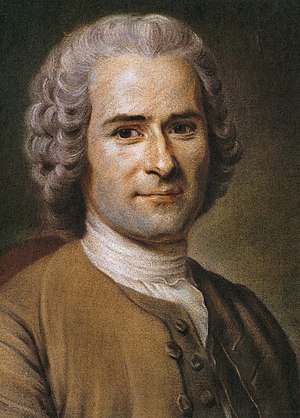
Are your principles not engraved in all hearts, and in order to learn your laws is it not enough to go back into oneself and listen to the voice of ones conscience in the silence of the passions? There you have true philosophy. Let us learn to be satisfied with that, and without envying the glory of those famous men who are immortalized in the republic of letters, let us try to set between them and us that glorious distinction which people made long ago between two great peoples: one knew how to speak well; the other how to act well.
Share this quote:
I am not worried about pleasing clever minds or fashionable people. In every period there will be men fated to be governed by the opinions of their century, their country, and their society. For that very reason, a freethinker or philosopher today would have been nothing but a fanatic at the time of the League.* One must not write for such readers, if one wishes to live beyond one’s own age.
Share this quote:
I am not made like any of those I have seen. I venture to believe that I am not made like any of those who are in existence. If I am not better, at least I am different.
Share this quote:
Man is born free, and everywhere he is in chains.
Share this quote:
What, then, is the government? An intermediary body established between the subjects and the sovereign for their mutual communication, a body charged with the execution of the laws and the maintenance of freedom, both civil and political.
Share this quote:
In any case, frequent punishments are a sign of weakness or slackness in the government. There is no man so bad that he cannot be made good for something. No man should be put to death, even as an example, if he can be left to live without danger to society.
Share this quote:
Happy am I, for every time I meditate on governments, I always find new reasons in my inquiries for loving my own country.
Share this quote:
Government in its infancy had no regular and permanent form. For want of a sufficient fund of philosophy and experience, men could see no further than the present inconveniences, and never thought of providing remedies for future ones, but in proportion as they arose.
Share this quote:
Liberty may be gained, but can never be recovered. (Bk2:8)
Share this quote:
Our will is always for our own good, but we do not always see what that is; the people is never corrupted, but it is often deceived... (Bk2:3)
Share this quote:
Laws are always useful to those who possess and vexatious to those who have nothing.
Share this quote:
A feeble body makes a feeble mind. I do not know what doctors cure us of, but I know this: they infect us with very deadly diseases, cowardice, timidity, credulity, the fear of death. What matter if they make the dead walk, we have no need of corpses; they fail to give us men, and it is men we need.
Share this quote:
But in some great souls, who consider themselves as citizens of the world, and forcing the imaginary barriers that separate people from people...
Share this quote:
They say that Caliph Omar, when consulted about what had to be done with the library of Alexandria, answered as follows: If the books of this library contain matters opposed to the Koran, they are bad and must be burned. If they contain only the doctrine of the Koran, burn them anyway, for they are superfluous. Our learned men have cited this reasoning as the height of absurdity. However, suppose Gregory the Great was there instead of Omar and the Gospel instead of the Koran. The library would still have been burned, and that might well have been the finest moment in the life of this illustrious pontiff.
Share this quote:
If there is in this world a well-attested account, it is that of vampires. Nothing is lacking: official reports, affidavits of well-known people, of surgeons, of priests, of magistrates; the judicial proof is most complete. And with all that, who is there who believes in vampires?
Share this quote:
The first sentiment of man was that of his existence, his first care that of preserving it.
Share this quote:
To renounce liberty is to renounce being a man, to surrender the rights of humanity and even its duties.
Share this quote:
To renounce freedom is to renounce ones humanity, ones rights as a man and equally ones duties.
Share this quote:
Liberty is like rich food and strong wine: the strong natures accustomed to them thrive and grow even stronger on them; but they deplete, inebriate and destroy the weak.
Share this quote:
Political writers argue in regard to the love of liberty with the same philosophy that philosophers do in regard to the state of nature; by the things they see they judge of things very different which they have never seen, and they attribute to men a natural inclination to slavery, on account of the patience with which the slaves within their notice carry the yoke; not reflecting that it is with liberty as with innocence and virtue, the value of which is not known but by those who possess them, though the relish for them is lost with the things themselves. I know the charms of your country, said Brasidas to a satrap who was comparing the life of the Spartans with that of the Persepolites; but you can not know the pleasures of mine.
Share this quote: